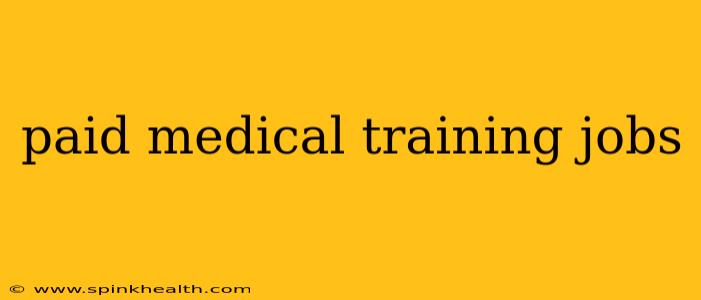Paid Medical Training Jobs: Launch Your Healthcare Career with Hands-On Experience
The world of healthcare is vast and rewarding, but breaking into the field can feel daunting. Many aspiring medical professionals wonder: how can I gain valuable experience and earn a paycheck? The answer lies in the realm of paid medical training jobs. These opportunities offer a unique blend of practical skills development and financial compensation, paving the way for a successful healthcare career. This isn't just about entry-level positions; you'll find options across various medical specializations and experience levels. Let's explore this exciting path.
What are some examples of paid medical training jobs?
This is a broad category encompassing many different roles. Think of it as a stepping stone – a chance to dip your toes into the healthcare world and gain practical experience before committing to a full-fledged career. Examples include:
-
Medical Assistant: A common entry-level position involving assisting physicians with clinical and administrative tasks. This often involves on-the-job training and can lead to further specialization.
-
Certified Nursing Assistant (CNA): CNAs provide basic patient care under the supervision of nurses or other healthcare professionals. Formal training is often required, but many facilities offer paid training programs.
-
Emergency Medical Technician (EMT): EMTs provide emergency medical care in pre-hospital settings. Rigorous training is necessary, but the job itself is a paid position offering invaluable experience.
-
Pharmacy Technician: Pharmacy technicians assist pharmacists in dispensing medication and managing inventory. Many pharmacies provide paid training for aspiring technicians.
-
Phlebotomist: Phlebotomists collect blood samples from patients. This role requires specialized training, often offered through paid apprenticeship programs or vocational schools.
-
Home Health Aide: Home health aides provide personal care and support to patients in their homes. This often involves on-the-job training and can be a great introduction to geriatric care.
How can I find paid medical training jobs?
Finding the right paid medical training job requires a multi-pronged approach:
-
Online Job Boards: Sites like Indeed, Monster, and LinkedIn are excellent resources for searching for healthcare-related jobs. Use keywords like "medical assistant training," "paid CNA training," or "pharmacy technician apprenticeship."
-
Hospital and Clinic Websites: Check the career pages of local hospitals and clinics directly. Many healthcare facilities offer internal training programs and apprenticeships.
-
Vocational Schools and Community Colleges: These institutions frequently have partnerships with healthcare facilities and can help connect you with paid training opportunities.
-
Networking: Talk to healthcare professionals in your network. They may know about openings or be able to provide valuable advice.
What are the benefits of paid medical training jobs?
Beyond the obvious financial advantage, there are several key benefits to pursuing paid medical training jobs:
-
Hands-On Experience: You'll gain practical skills and knowledge that you can't learn in a classroom setting.
-
Networking Opportunities: You'll meet and work alongside experienced healthcare professionals, building valuable connections for your future career.
-
Career Exploration: Paid training allows you to explore different areas of healthcare to see what best suits your interests and skills.
-
Resume Builder: Adding paid medical training experience to your resume significantly boosts your chances of landing a full-time position.
What skills and qualifications do I need for paid medical training jobs?
The specific requirements vary depending on the job, but generally, a positive attitude, strong work ethic, and basic computer skills are essential. Some roles require formal certifications or licenses, while others offer on-the-job training. Always carefully review the job description to ensure you meet the minimum qualifications.
Are there paid medical training jobs for people with no experience?
Yes! Many entry-level positions in healthcare welcome individuals with little to no prior experience, offering on-the-job training. CNAs, medical assistants, and home health aides are excellent examples of roles that often hire individuals with no prior experience.
How long does paid medical training usually take?
The length of training varies widely depending on the specific job and the employer. Some programs may last a few weeks, while others can take several months or even a year. Always clarify the training duration before accepting a position.
Embarking on a healthcare career can be a fulfilling journey. By leveraging the opportunities presented through paid medical training jobs, you can gain valuable experience, build your skills, and earn while you learn – setting the stage for a rewarding career in the medical field.

